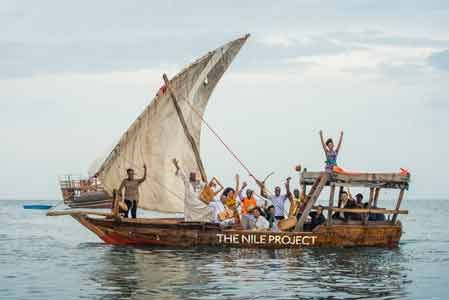National Public Radio says the Nile Project is producing harmony in a divided region while the New York Times calls euphoric the performance that, to a traditionalist, looks like an ungainly mélange: a gathering of musicians from the 11 countries of the Nile basin, playing instruments that weren’t made to share a stage or a song.
Founded on the belief that music can change perceptions and inspire action, The Nile Project brings together 27 musicians from the 11 countries along the Nile to encourage dialogue about sustainability in the Nile basin.
The project’s residency at the Clarice Smith Performing Arts Center culminates in a concert in the center’s Dekelboum Concert Hall on Sunday, April 26, 2015 at 7 p.m.
Officials said in a news release that the residency will also include three discussion panels, a lunch discussion at the University of Maryland on “Female Perspectives on the Nile,” a creative dialogue on the “Role of Musicians in Peace and Environmental Movements,” which will be held on Monday, April 27, 2015 at 6:45 p.m. in the Baird Auditorium of the Smithsonian National Museum of History in Washington— and a panel on “Crowd Sourcing Solutions for a Sustainable Nile Basin at 7 p.m. on Tuesday, April 28 in the Leah M. Smith Lecture Hall at the Clarice.
“I was trying to be part of this new thing that’s happening in Egypt,” said Mina Girgis, an ethnomusicologist and the president and CEO of the Nile Project. “That’s when I started talking to a friend of mine about starting a project together, a musical project that would bring together musicians from all over the Nile countries.”
He said while visiting San Francisco, a friend who is a Japanese accordion player, invited him to watch him perform with an Ethiopian folk band.
“It was amazing,” Girgis said. “I was amazed by the music and I was amazed by my own ignorance of music because Ethiopians are on the same river as we are in Egypt, and yet I’d never been exposed to their music or their culture.”
From that point, Girgis says he realized that the Grand Ethiopian Renaissance Dam was being constructed and conflict bubbled across the African continent.
He said he created the Nile Project as a way to spark positive discussion and expose individuals to various cultures while also encouraging everyone to understand that the countries situated along the Nile are part of one ecosystem.
“It was the kind of conflict that needed a solution, one that everyone could embrace,” Girgis said. “Everyone always talked about the water, so we had to change the conversation and so we made it about music and we got all of these musicians together and I think it has really helped to make a difference.”
Now, they are bringing the musicians and others to Maryland as part of an American tour that Girgis hopes will shed light on the Nile and on togetherness.
The Nile Project is an education and development initiative that uses music to help find additional ways in which the water along the Nile can peacefully be shared. With periodic two-week residencies at institutions and universities like in Maryland, musicians from a variety of Nile basin countries gather to teach each other their musical styles.
The musicians collaborate to compose songs that speak to their relationship with the Nile and with each other, combining a variety of languages, tonal systems and rhythmic systems.
A powerful pan-Nile percussion section drives this orchestra of Ethiopian masenko and saxophone, Egyptian ney, oud, violin, simsimiya and tanbura, and Ugandan adungu, bass guitar and six vocalists, including Dina El Wedidi from Egypt, sing in their native tongue.
“It’s so much fun to be a part of this and I’ve been able to learn a lot,” El Wedidi said.
The combination of instruments prove to be an important element in the water conversation that’s highlighted and necessary, Girgis said. “It’s a conversation that is not defined by one person’s priorities,” he said. “It’s an opportunity for everyone to voice their concerns.”
Tickets for the performance at the Clarice Smith Center are $25, $20 and $10 and can be purchased by calling 301-405-2787 or online at www. theclarice.umd.edu
